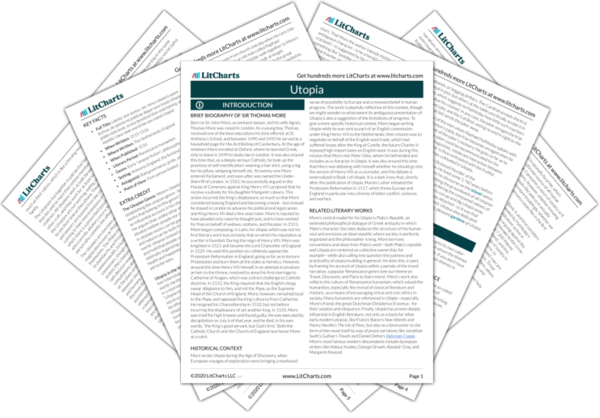Thomas More Quotes in Utopia
Nothing is more easy to be found than barking Scyllas, ravening Calaenos, and Laestrygons, devourers of people, and suchlike great and incredible monsters. But to find citizens ruled by good and wholesome laws, that is an exceeding rare and hard thing.

Unlock explanations and citation info for this and every other Utopia quote.
Plus so much more...
Get LitCharts A+This school philosophy is not unpleasant among friends in familiar communication, but in the council of kings, where great matters be debated and reasoned with great authority, these things have no place.
It is not possible for all things to be well unless all men were good.
As I cannot agree and consent to all things that he [Hythloday] said…so must I needs confess and grant that many things be in the Utopian weal-public which in our cities I may rather wish for than hope after.

Thomas More Quotes in Utopia
Nothing is more easy to be found than barking Scyllas, ravening Calaenos, and Laestrygons, devourers of people, and suchlike great and incredible monsters. But to find citizens ruled by good and wholesome laws, that is an exceeding rare and hard thing.

Unlock explanations and citation info for this and every other Utopia quote.
Plus so much more...
Get LitCharts A+This school philosophy is not unpleasant among friends in familiar communication, but in the council of kings, where great matters be debated and reasoned with great authority, these things have no place.
It is not possible for all things to be well unless all men were good.
As I cannot agree and consent to all things that he [Hythloday] said…so must I needs confess and grant that many things be in the Utopian weal-public which in our cities I may rather wish for than hope after.











